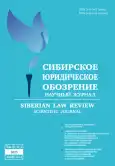The Proportionality Between the Size of the Fine and the Category of Crime
- Authors: Urusov A.A.1
-
Affiliations:
- Dostoevsky Omsk State University
- Issue: Vol 22, No 2 (2025)
- Pages: 282-293
- Section: CRIMINAL LEGAL SCIENCES
- Published: 07.07.2025
- URL: https://journal-vniispk.ru/2658-7602/article/view/343640
- DOI: https://doi.org/10.19073/2658-7602-2025-22-2-282-293
- EDN: https://elibrary.ru/EYKUKH
- ID: 343640
Cite item
Full Text
Abstract
This study aims to identify and analyze the challenges associated with imposing and enforcing criminal penalties in the form of fines. Like any form of punishment, the fine must serve the core objectives of the penal system: restoring social justice, preventing future offenses, and rehabilitating the offender. The effectiveness of these objectives is directly linked to the fairness of the sentence imposed. The research reveals that fines occupy fourth place in frequency among all types of imposed criminal penalties. However, their application does not always succeed in achieving the intended penal objectives. A central thesis of the article is that the amount of a fine must be proportionate to the severity of the offense committed. Yet, current Russian criminal law contains provisions where multi-million-ruble fines are imposed even for minor and mid-level offenses, which, in practice, undermines the feasibility and fairness of enforcement. The Author critically reviews diverse scholarly and practitioner perspectives found in legal literature, and conducts an in-depth analysis of judicial practice related to fines as a primary form of criminal punishment. This analysis confirms that the amount of the fine specified in the sanctions of the Special Part of the Russian Criminal Code should directly correspond to the gravity of the criminal act. The study applies general scientific methods such as analysis, synthesis, and a systematic approach to exploring socio-legal phenomena. In addition, content analysis of scholarly publications and online resources dedicated to the application of fines as criminal sanctions was employed. The scientific relevance of the article lies in its argument for establishing legally binding maximum fine thresholds based on the category of the offense. The Author proposes both theoretical and practical legal reforms aimed at improving the structure and proportionality of financial penalties. The practical value of the research is in its contribution to enhancing the preventive and rehabilitative effectiveness of fines within the broader system of criminal penalties.
About the authors
Aleksandr A. Urusov
Dostoevsky Omsk State University
Author for correspondence.
Email: knight700@yandex.ru
ORCID iD: 0009-0004-0649-4985
Associate Professor of the Department of Criminal Law and Criminology, Candidate of Legal Sciences, Associate Professor
Russian Federation, 55А Mira pr., Omsk, 644077References
- Nasirov N. I. Fine as a Kind of Criminal Punishment: Legal Aspects. Penal Law. 2014;1:24-27. (In Russ.)
- Ogorelkov D. A. Legislative Definition of Punishment in the Form of A Fine as the Basis of Its Criminal - Legal Impact. Vestnik of Siberian Law Institute of the MIA of Russia. 2021;2:181-185. https://doi.org/10.51980/2542-1735_2021_2_181 (In Russ.)
- Lopashenko N. A. On Criminal Punishments in Russia: Notes on the Margins of the Criminal Code (from the Present Time to the Future). Statute. 2021;12:33-48. https://doi.org/10.37239/0869-4400-2021-16-12-33-48 (In Russ.)
- Utkin V. A. The Paradoxes of Fine. Criminal Justice. 2014;2:9-12. (In Russ.)
- Tkachevskiy Y. M. Substitution of One Criminal Sentence by Another in the Process of Its Enforcement. Moscow University Bulletin. Series 11. Law. 2006;2:20-34. (In Russ.)
- Nepomnyashchaya T. V. Penalty as a Form of Criminal Punishment: Problems of Legal Regulation and Application in Practice. Herald of Omsk University. Series Law. 2013;3:190-195. (In Russ.)
- Mikhlin A. S. Execution of Non-Custodial Sentences. Russian Justice. 1997;6:41-43. (In Russ.)
- Gritsai O. V. Current Issues in Applying Fines as a Judicial Measure of Financial Penalty. Russian Justice. 2008;10:66-72. (In Russ.)
- Kuznetsova N. F. Seven Years of the Criminal Code of the Russian Federation. Moscow University Bulletin. Series 11. Law. 2003;1:3-19. (In Russ.)
- Makarov A. V., Misyulya L. A. The Financial Penalty as a Legal Sanction in the System of Measures of Criminal Liability. Russian Justice. 2017;8:25-28. (In Russ.)
- Bazhenov O. V. Peculiarities of Punishment by a Fine. Man: Crime and Punishment. 2012;1:66-70. (In Russ.)
- Turyshev A. A. Avaricious Motive of Crime. Scientific Bulletin of the Omsk Academy of the MIA of Russia. 2020;26(4):17-21. https://doi.org/10.24411/1999-625X-2020-11003 (In Russ.)
- Galperin I. M. Punishment: Social Functions and Practice. Moscow: Yuridicheskaya Literatura Publ.; 1983. 206 p. (In Russ.)
- Popova E. E. Certain Problems of Realization of Criminal Punishment in the Form of Fine and Perspectives of Resolution Thereof with Participation of Public. Russian Investigator. 2012;18:30-31. (In Russ.)
- Tkhaishaov Z. A. To a Question on Wider Application of the Penalty as the Form of Criminal Punishment. Criminal Law. 2010;3:63-66. (In Russ.)
- Pleshkov V. A. Enforcement of Court-Imposed Fines as Criminal Sanctions. Criminal-Executory System: law, economy, management. 2009;4:20-24. (In Russ.)
- Buranov G. K. Consequences of Evasion of Fine Payment under the Criminal Code of the Russian Federation and CIS Countries. Vestnik of Volzhsky University named after V. N. Tatishchev. 2010;72:33-37. (In Russ.)
- Stepashin V. M. The Arbitrariness of Criminal Punishment (the Example of the Fine). Law Enforcement Review. 2018;2(3):135-141. https://doi.org/10.24147/2542-1514.2018.2(3).135-141 (In Russ.)
- Stepashin V. M. The Implementation of Penal Economy in Criminal Responsibility and Sentencing. Moscow: Yurlitinform Publ.; 2024. 326 p. (In Russ.)
Supplementary files












